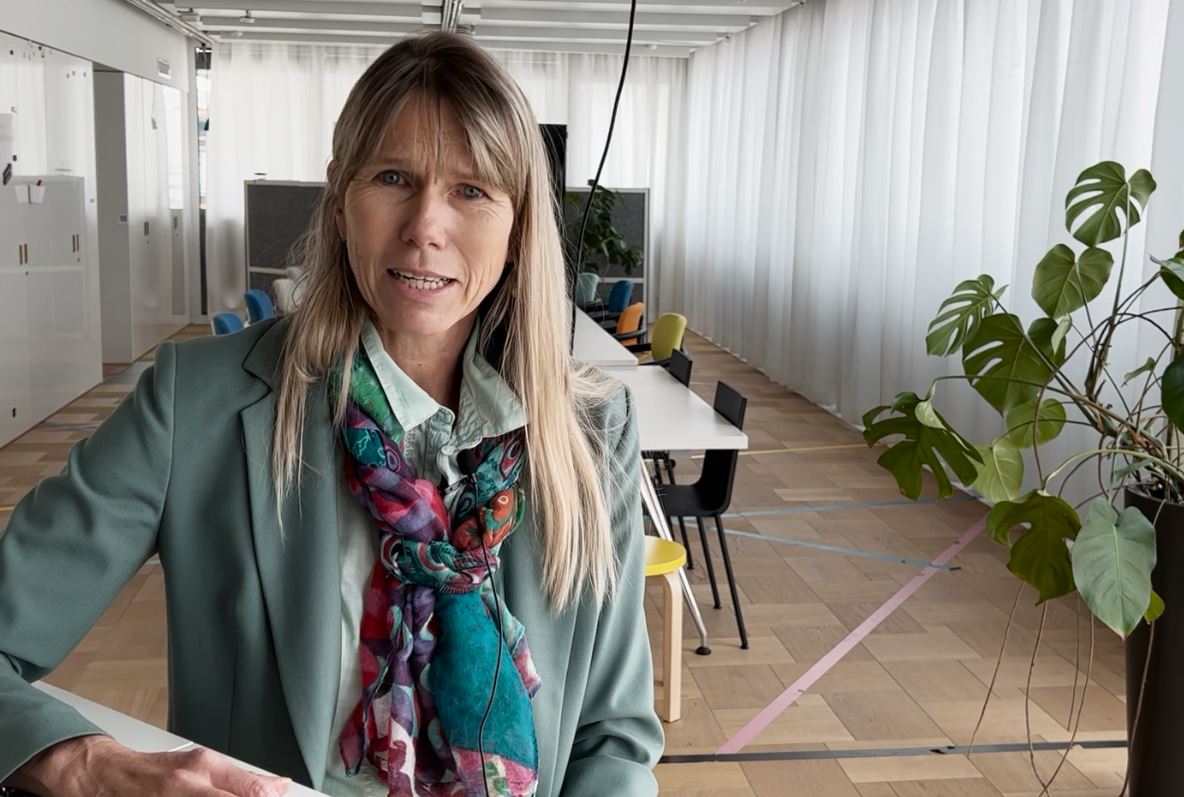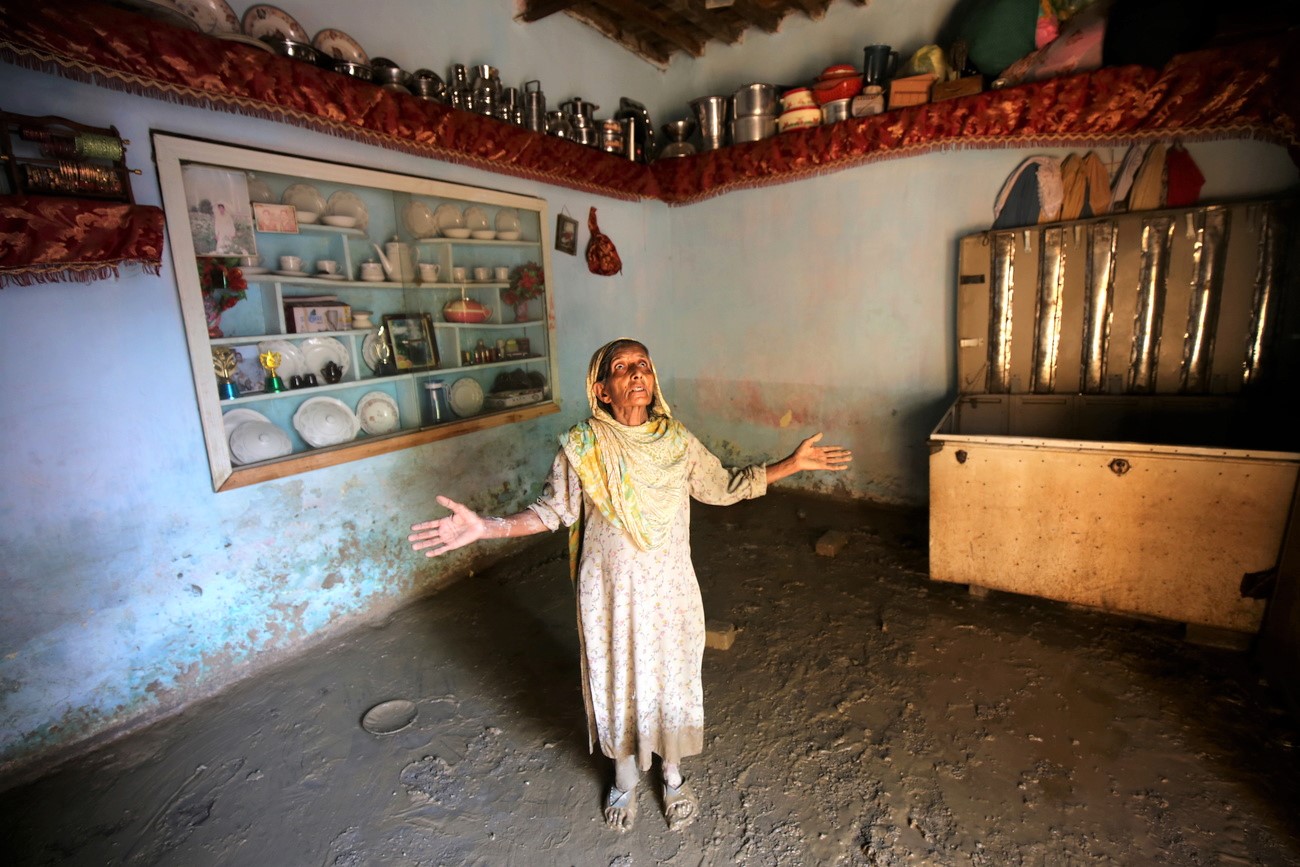
View from Geneva: women key to addressing climate crisis

Increasing the number of women in leadership positions in countries and companies would be a boon to global efforts to tackle the climate crisis. That is the view of María Mendiluce, who heads the We Mean Business Coalition, an umbrella organisation working with large companies to take action on climate change. SWI swissinfo.ch caught up with this change-making CEO in Geneva.
SWI swissinfo.ch: Your organisation is largely based in Geneva. What are the advantages and disadvantages of your location?
María Mendiluce: In the beginning, we were a virtual organisation, but given the importance of personal contacts, we felt the need to have a physical location. So I am based in Geneva with a number of colleagues. We also have offices in London and New York.
Geneva has the advantage of being well connected with the rest of the world. Besides, the presence of so many international organisations here is a great asset. And finally, Swiss neutrality is important for ensuring our worldwide expansion.
Born in Spain, María Mendiluce holds a doctorate in energy economics from Universitad Pontificia Comillas in Madrid.
She is a specialist in sustainable development, energy and climate action and has 25 years of experience in the business world, international organisations, academia and government.
She was managing director of the World Business Council for Sustainable Development (WBCSD) in Geneva, before taking over the lead role at the We Mean Business Coalition in May 2020.
SWI: The stated goal of your coalition is to “catalyse business and policy action to halve CO2 emissions by 2030”. Is the world on the way to achieving this?
M.M.: To tell the truth, we are not yet on the right path. Carbon neutrality and a temperature rise of only 1.5°C are very difficult goals to achieve. We already see temperatures rising by 1.1°C. We need to make every effort to keep temperatures even a fraction of a degree down. Time is running out and that is our biggest challenge.
SWI: Most companies are busy showcasing their efforts and successes in terms of sustainability. Is “greenwashing” now the general rule?
M.M.: In general, I see three categories of companies out there. The first is those that really try to fight global warming. We work with these companies to develop reliable methods to measure the impacts of their efforts.
In the second category, there are companies that take sporadic action in favour of sustainability. Yet these companies trumpet this kind of action in hope of selling more to their customers, in spite of the fact that it may have little or no real effect on climate change.
In third place – and here we have the biggest problem – there are many, many companies who do absolutely nothing and who couldn’t care less about the challenge of global warming.
SWI: Governments are being urged – especially by the private sector – to implement policies in favour of clean energies. Why is government action so slow on this?
M.M.: The four-year election cycle is a real challenge. On the the other hand, countries with stable government like Switzerland find it easier to take decisive actions in the long term. China’s planning has actually been quite effective: half of the electric cars sales in the world are done there.
Another problem is bureaucratic inertia, meaning slowness in planning projects, awarding building permits, buying land and connections to the electric grid. To say nothing of local opposition. In some cases, it takes three years to get a permit for a solar installation. And four for a wind farm.

More
‘Switzerland should be a model country for innovative sustainability solutions’
SWI: You give China as an example. Does that mean that authoritarian regimes are better able to confront climate change than the democracies?
M.M.: Countries having a vision and a capacity for long-term planning – whether they are authoritarian or not – are better able to fight climate change. In fact, businesses need certainty and stability to be able to invest in new technologies. Besides, good planning – especially when it comes to necessary regulatory changes – speeds up investment in clean energies.
SWI: In terms of policies on sustainability, which countries get a good mark?
M.M.: No country is perfect. In general, Britain is out in front with its ambitious goals. And companies there are now required to submit a climate transition plan. On the other hand, when it comes to insulating buildings, Britain still has work to do.
Norway is exemplary due to the number of electric cars it has, but then the same country is selling huge amounts of oil and gas to the rest of the world. Spain is well positioned because of its focus on hydrogen and the US has started massive investment in climate programmes.

More
Switzerland braces for winter energy crunch
SWI: What about Swiss policy on climate issues?
M.M.: Given that the voters rejected the new CO2 legislation in June 2021, the government could do more in the way of incentives, as is happening in the US.
SWI: You work with seven non-profit organisations dealing with climate issues and the private sector. As an umbrella organisation, what value do you add?
M.M.: Our logo represents a rowing boat. Our main aim is to see that everyone is rowing in the same direction and all efforts are being coordinated. In this way, we will reach our goals faster. At the same time, because we are funded by several foundations – such as the Ikea and Hewlett foundations – and not directly by companies, our independence and credibility are assured. For this reason many companies follow our lead.

More
COP27 and the climate crisis: will rich countries pay?
SWI: At the last annual meeting of World Economic Forum (WEF) in Davos, the success of the First Movers CoalitionExternal link was celebrated with great enthusiasm. How is this initiative progressing?
M.M.: First of all, WEF is a fantastic platform for our coalition. The forum affords us a privileged access to many captains of industry and political leaders. Apart from WEF, we work with around fifty other partners.
Initially we launched – together with WEF – the initiative Mission Possible PartnershipExternal link to show the private sector that it was possible, for example, to produce steel or transport goods while respecting the limits of carbon neutrality.
Then the First Movers Coalition was launched to get companies to take the first step by committing themselves to buy decarbonised products and services (steel, transport, etc.). The goal of this initiative is to send a strong signal to the market. I am glad to say it is making good progress and more than 50 companies and ten countries have signed up.
SWI: Also at the last WEF meeting, the message was being hammered home that “sustainability means profitability”. Is this borne out by the facts?
M.M.: According to a study by the Unily company, 65% of employees would prefer to work for an organisation that respects the environment. Furthermore, reports from the Oliver Wyman consultancy and CDP (an NGO which partners with our coalition) show that sustainable firms are profitable firms. Finally, in our estimation, every household should save about $2,000 (CHF1,980) per year once the energy transition is well advanced in their country.
SWI: In your organisation, women are overrepresented, including at managerial levels. Are women more sensitive to sustainability?
M.M.: Several studies have suggested that women are more impacted than men by the climate crisis, in particular in developing countries. In general, these are women with the responsibility for feeding their families. When the climate crisis hits, it is not so easy for them to move away with their families. Accordingly, women are often more sensitive to the problems of the planet. What’s more, they are more likely to collaborate and achieve a consensus.
SWI: Are women better able to take on climate challenges?
M.M.: In my view, a greater number of women in positions of leadership – both in companies and governments – would have a very positive impact on the planet. Yet I also accept the need for diversity (in terms of skills, ages, and nationalities, as well as men and women) in teams, for that leads to adopting innovative approaches to cope with the challenges now facing the planet.
Edited by Samuel Jaberg; translated from French by Terence MacNamee

In compliance with the JTI standards
More: SWI swissinfo.ch certified by the Journalism Trust Initiative




























You can find an overview of ongoing debates with our journalists here . Please join us!
If you want to start a conversation about a topic raised in this article or want to report factual errors, email us at english@swissinfo.ch.